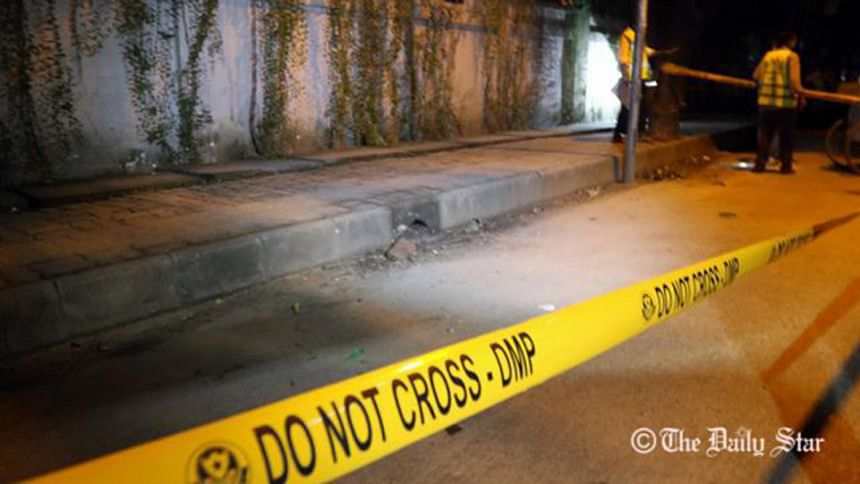Crackdown on, so are covert militant activities

On November 2, someone from Dhaka entered the domain of al-Qaeda in the Indian Subcontinent (AQIS). Investigators found the cultural institute of a foreign country was the location of the person when he logged in to the domain. He was using the wi-fi facility of the institute.
Not everyone has access to the AQIS domain, believed to be operated from India. One has to know a certain operating system and have the username and password for it. "Only the tested and trusted persons are provided those," said an investigator, on condition of anonymity.
About a month later, the same person used mobile phone and internet near a temple in the capital's Rayerbazar area.
Investigators have no information on the person's latest whereabouts and movements, but they believe he has been working on a plan.
"We tried to track the person further but he was very tactfully using communications technology," said an official.
Security at the cultural institute and the embassy of that foreign country has been stepped up following the development.
Also recently, a small group of "highly" motivated Hizb-ut Tahrir men had secret meetings in Mohammadpur, according to officials of an intelligence agency.
“They held several meetings at two mosques in Mohammadpur after Maghrib prayers but their last meeting was inside the Mohammadi Housing complex,” said one of the officials.
Investigators say the group was frequently changing meeting venues.
These are among the many findings that make law enforcers believe that radicals are very much active in the country despite the government's ongoing crackdown on militants.
Since the July 1 Gulshan attack, police have busted eight militant dens, leaving some 28 suspected militants killed. Firearms, bomb-making materials, improvised explosive devices (IEDs) and books on jihad were recovered there.
Still the radicals are operating secretly, using new platforms and techniques.
The non-violent Tablighi Jamaat is one such platform which militants -- affiliated with both al-Qaeda and Islamic State (IS) -- have started using to remain out of the law enforcers' radars, investigators say.
A day after police busted a militant den in Ashkona on December 24, ruling Awami League General Secretary Obaidul Quader said he believes the militants may strike again.
“After Gulshan incident, many have become complacent thinking that no such incident will happen further.... I have told you time and again that they [militants] seem to have been weakened but they could remain active secretly for a large-scale attack,” he said at a programme in Dhanmondi.
Some police officials who have sufficient knowledge about the secret movements of the militants echoed his view.
“They [militants] are operating digitally and also holding secret meetings, mostly in mosques where they discuss different targets to carry out attacks,” said a senior counterterrorism official.
"They may be thinking of big targets to have global impact," added the official.
In the last two years, investigators arrested at least a dozen militants and foiled several plots by tracking mobile phones and social media networks, especially Facebook.
Tracking electronic communications, police foiled a plot of pro-al-Qaeda militants who planned to storm a building on Kemal Ataturk Avenue during New Year celebration. "Some foreigners live in the house," said a police officer of Gulshan zone.
A police team was deployed there after officials learnt about the plot.
Last week some radicals were found talking about a church in Gazipur in a secret online group discussion. Investigators are trying to learn about the group members and their activities.
Law enforcers intensified efforts to track radicalism online but they find the job difficult as militants often use encrypted messaging apps.
Police believe the youths who recently went missing pose serious security threats as they might be working from hideouts.
A counterterrorism expert in Singapore, who studies the situations in Bangladesh, said Bangladeshi militants affiliated with IS and al-Qaeda are "very much" active in and outside the country.
"Some hardcore militants are yet to be nabbed. They are working with many other unknown militants," he told this correspondent, seeking anonymity.
He noted that involving children and women and using suicide vests in terror acts is a new and ominous development for Bangladesh.
Asked about the current capabilities of militant groups, Inspector General of Police AKM Shahidul Hoque said, "I should not say there is no threat.
“There is a low-level threat as there are some elements trying to be organised. Our intelligence is now strong enough to unearth and foil any plots."

 For all latest news, follow The Daily Star's Google News channel.
For all latest news, follow The Daily Star's Google News channel. 



Comments